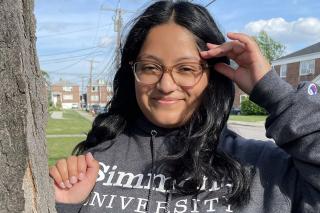McLean Hospital recently launched Deconstructing Stigma: Changing Attitudes toward Mental Health. This campaign challenges popular and erroneous assumptions about psychiatric disorders. Social work major Marina McCollum is a participant in the program. She spoke with us about her personal experiences with mental illness, her passion for social work, and the therapeutic effects of speaking out.
Tell us about the Deconstructing Stigma campaign.
Deconstructing Stigma is an initiative that McLean Hospital [Belmont, MA] developed to encourage people to speak about mental illness in a supportive and non-judgmental context. Since I was a former patient at McLean, they invited me to participate. Deconstructing Stigma invites us to tell our stories via public exhibitions. The first exhibition was at the Boston Logan Airport, and has since traveled elsewhere in the country. Visitors can view our photographs and read personal anecdotes about our struggles and resilience. As the exhibition shows, those afflicted with mental illness come from a variety of cultural and socioeconomic backgrounds.
I am very passionate about this issue because it has affected me personally. Besides my own troubles, I have lost loved ones to suicide. It is very important for us to stop stigmatizing mental illness, and people need to be more comfortable talking about uncomfortable issues. Deconstructing Stigma has given me a platform to use my voice in a proactive way. We hope that our stories will make a positive impact on someone who is feeling sad, isolated, or suicidal. I am very vocal about my opinions, and people appreciate that. I have also shared how mental illness changed my relationship with my mother, ultimately strengthening the bond between us. Overall, the experience has been very meaningful to me.
Is there a specific way that you acknowledge National Disability Independence Day (July 26)?
I think we should all acknowledge the monumental implementation of the Americans with Disabilities Act (1990), but we should also provide further support for those afflicted with mental illness. It is comforting to know that if I need a mental health day [away from work], I can take one. There is no reason for me to come into work if I am not able to perform my duties well.
Why did you choose to attend Simmons?
Simmons was the first college acceptance I received. As someone who contemplated dropping out of school after seventh grade, getting an admission plus a scholarship from Simmons was tremendous for me. My mom and I both cried.
Before Simmons, I had attended a therapeutic school, and I found that Simmons’ small-college environment made me feel very comfortable. I also like the fact that Simmons is diverse and welcoming. The School of Social Work is phenomenal, with many wonderful and compassionate professors. Indeed, Simmons has a stellar reputation in the larger social work world. My godmother works at Simmons too, and it is nice to have her here.
Why did you choose to major in Social Work?
I was not even planning on attending college when I was in high school, but my school counselor said I have a strong sense of leadership and he convinced me to apply. In my personal statement, I discussed the personal struggles I have had to overcome, and this probably influenced me to be a social worker. My mother, Laura McCollum, also attended Simmons (MSW ’85) and studied social work. In my personal life, I have had great experiences with social workers, so that also inspired me to become one. I have lost special people in my life because of mental illness, and have experienced illness myself too. If I can save one life, that will fulfill my life and my heart.
What is your advice for college students who are dealing with mental health issues?
It is okay to have the emotions and feelings that you have. They are valid and nobody should judge you for that. It can be intimidating to ask for help, but it is cathartic and healing to have a safe space to discuss these topics. College is overwhelming for everyone, so we need trustworthy individuals (friends, therapists, etc.) we can approach with our specific concerns. For myself, this has been really beneficial.
I also have therapeutic coping skills, like journaling and doodling. Pets are also very comforting to me; animals have a strong sense of intuition and can elevate your mood.
This opportunity with Deconstructing Stigma has enabled me to cultivate my leadership skills. Beyond the campaign, I will be running a 5K to support suicide awareness, and the American Foundation for Suicide Prevention offered me a spot for the Boston Marathon — though I’m not yet sure if I am ready to run a marathon! I have also been proactive in trying to gather additional mental health resources for students at Simmons.

